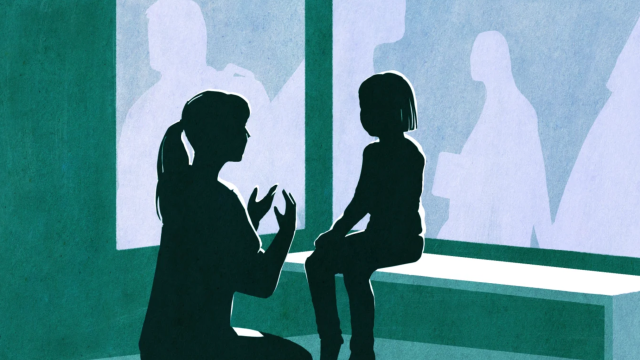One of the hardest things about being a parent is living with the knowledge that there are so many potential scenarios or people in the world who could bring harm to our children. One of the scariest and most damaging things that could happen to our kids is sexual abuse or assault — especially given that the abuser so often is someone they know and trust, or someone we know and trust.
That’s why it’s important to start conversations about safety, privacy, and consent while they’re young, and keep those conversations going as our children grow and reach different developmental stages. But it can be hard to know where to start and the right words to use, so I talked with Dr. Tia Kim, vice president of education, research, and impact at the Committee for Children for advice.
The conversation should begin when they’re toddlers
For such a scary and uncomfortable conversation, you might not think it makes sense to begin laying the ground work when they’re just two or three years old, but these are the years when you can introduce some basic concepts about privacy and consent in a pretty natural way. The focus, Kim says, should always be on personal safety; the same way you talk about the need for them to wear a helmet when they ride a bike or wear a mask to prevent spreading germs, you can also teach kids about the difference between safe touches and unsafe touches.
“I really like to remember the ‘Three R’s’ of safety when it comes to child sexual abuse prevention,” she says. “The first ‘R’ being, teaching your kids to recognise safe versus unsafe touches; [next] being able to refuse unwanted touches; and [finally] that it’s also really important to report the behaviour if it’s happening to them.”
With very young children, you can begin by identifying their body parts — by their anatomically correct names — and normalize the conversations by incorporating them into regular daily routines.
“As a parent or caregiver, you can find teachable moments to bring it up where it seems very natural,” Kim says. “I have two boys. When they were really little and I was potty training them, every so often when I was helping them go to the bathroom, I would say, ‘And who can touch your private body parts?’, like it was just a natural kind of conversation to have because that’s what was happening.”
[referenced id=”839595″ url=”https://www.lifehacker.com.au/2018/06/teach-your-kids-the-anatomically-correct-names-of-their-body-parts/” thumb=”https://www.gizmodo.com.au/wp-content/uploads/sites/4/2018/06/07/b8erslv795eb2cyol5h4-300×169.jpg” title=”Teach Your Kids The Anatomically Correct Names Of Their Body Parts” excerpt=”An anonymous mother wrote a piece for Today titled “How to Imagine the Unimaginable”. It’s the type of story that as a parent, you can’t bear to read, which means that you must (though do be warned that it deals with sexual abuse).”]
And keep it going as they get older
As kids get older, you can continuously build upon these conversations with more nuance and adding more detail. A good “safety rule” for an older child might to be remind them that no adult should ever ask them to keep a secret about touching or unsafe touches. You may have conversations as you’re tucking them into bed or, as they enter adolescence, when you’re driving in the car so they don’t have to make eye contact with you. It’s important for them to know these topics aren’t ever off limits, even if they can feel a bit awkward.
If you’re struggling with when or how to talk to your child about sexual abuse, the Committee for Children’s “Hot Chocolate Talk” campaign has put together how-to conversation-starter guides for parents of kids of all ages here:
With older kids, it’s also important to reiterate that sexual abuse isn’t something that only happens in person, Kim says.
“It could happen online, as well, so I think that’s an important part of the conversation,” she says. “Saying, ‘It’s never ok for an older person to show you pictures of their private body parts or ask you to do the same,’ things like that. Creating safety around the online space, as well, is important for parents to keep in mind.”
If they disclose abuse
If your child — or any child — discloses that abuse has happened or is happening, you are likely to feel overwhelmed by how to react, how to process the information they’re giving you, and how to manage your own emotions about it in the moment. The best, most important thing you can do in that scenario is to stay calm — and believe them.
“Most importantly is that you really have to believe what the kid is saying to you,” Kim says. “Very rarely do children lie about being sexually abused. So I think that’s a really important thing for adults to keep in mind; even simple statements like, ‘I hear you,’ and, ‘I believe you,’ are very powerful.”
Kim says that in 90 per cent of child sexual abuse cases, the perpetrator is someone the child and family knows pretty well, which can make it even more difficult for the child to disclose it has happened. That’s why, she says, having these on-going conversations is so important for keeping the lines of communication open so that if they do become victims of abuse, they feel it’s something they can come to you to talk about.

Leave a Reply
You must be logged in to post a comment.